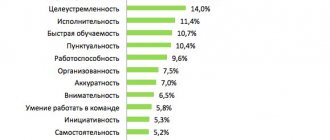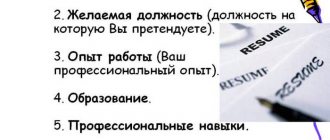When compiling a resume, applicants usually describe “Work Experience” in great detail, and the “Personal Qualities” section often remains blank; many treat this item formally, underestimating its significance. But for the employer, this information is no less important than the professional skills, achievements and functional responsibilities of the applicant at the previous place of work. By indicating your positive personal qualities in your resume, you will have a much greater chance of attracting attention to your candidacy.
Human qualities for a resume. List
A sample list looks like this, but it is, of course, not completely exhaustive:
- activity;
- accuracy;
- analytic skills;
- ambition;
- fast learner;
- attentiveness;
- politeness;
- high efficiency;
- flexibility;
- discipline;
- conscientiousness;
- friendliness;
- diligence;
- initiative;
- creativity;
- communication skills;
- loyalty;
- persistence;
- reliability;
- resourcefulness;
- focus on results;
- non-conflict;
- optimism;
- organizational skills;
- oratory;
- result orientation;
- organization;
- responsiveness;
- responsibility;
- decency;
- presentable appearance;
- enterprise;
- integrity;
- punctuality;
- innovation;
- self-control;
- independence;
- self-criticism;
- scrupulousness;
- justice;
- ability to make quick and independent decisions;
- stress resistance;
- desire to improve professional level, self-improvement, professional growth, development;
- a creative approach to finding ways to complete assigned tasks;
- hard work;
- self confidence;
- skill to work in team;
- ability to adapt to change;
- ability to persuade;
- good diction;
- determination;
- sense of humor;
- honesty;
- energy.
Positive
It’s not enough to just list all your best qualities in your resume; you also need to justify them. The rule of the “golden mean” works here - a person should not excessively praise and describe at length all his positive aspects.
A resume should not exceed 1-1.5 pages, and besides, the employer has neither the time nor the desire to read someone’s stories about himself.
We highlight the business aspects
Whether a person is hired is influenced not so much by his personal qualities as by his professional ones. Therefore, it is on them that the main emphasis should be placed.
There is no need to list all your skills. Much in this matter depends on the position for which the person is applying. Different business qualities will be preferable for a manager and an accountant.
Therefore, you need to look at the text of the vacancy announcement, look at the professional requirements and indicate in your resume exactly those that are available.
It is important to ensure that business and personal qualities do not conflict with each other
Negative
If the employer does not ask you to indicate separately bad qualities in your resume, then you do not need to do this yourself.
Examples of qualities that are likely to be perceived as negative are:
- excessive emotionality;
- inability to lie;
- poor communication skills;
- inability to work in a team;
- lack of work experience;
- lack of specialized education, etc.
Examples by profession
Examples of personal and business qualities in a resume are given below. But be careful: this is information for reference only, no need to rewrite everything. HR specialists very quickly figure out such “tricks”, and this often becomes the reason for guaranteed refusal.
Example #1: manager
Personal and professional qualities for a sales manager's resume should be closely interrelated. This is a person on whose shoulders serious responsibilities are entrusted, because it is on him that how the company will develop in the future depends.
So, personal qualities in a resume: an example for a male manager:
- sociability (communication skills);
- ability to persuade;
- persistence;
- ability to resolve conflict situations;
- initiative.
Of course, women can also work in management. And in this case, it is important to indicate how emotionally resistant they are to stressful situations. But it is important to know how to write “stress-resistant” on a resume, since this term is not always normally perceived by some company managers.
If you want to display your psycho-emotional stability, it is better to write “reliable”, “emotionally restrained”. It's more respectable and professional.
Example two: accountant
An accountant is a specialist on whom, without exaggeration, the fate of the entire company depends. Any inaccuracies or errors can lead to serious financial losses for the company.
For an accountant's resume, knowledge of special programs is important. A candidate for this position must indicate each and every program with which he has worked.
As for strengths, it should be noted here: reliability, emotional balance, perseverance, good learning ability, responsibility. As for point 4, it should not be written “in plain text” in an official resume. A synonym for the term “learning ability” for a resume may sound like “susceptibility” (to new information).
Example #3: leadership position
It would seem that what is difficult about being a leader? There is perseverance, ambition and a “core of steel” in your character, which means everything will be easy and simple. Well, no! In fact, there are much more requirements, and even nitpicking, for such candidates than for ordinary employees.
So, are you wondering, “how can I present my strengths” to a potential manager’s resume? Here's a good example:
- loyalty;
- patience;
- the ability to be a leader;
- justice;
- hardness;
- determination;
- perseverance;
- analytical thinking.
Many companies work with foreign partners, so if you, as a potential head of one of the departments, indicate your knowledge of foreign languages in your resume, this will be a huge plus for you.
Example four: secretary
When many people hear the word “secretary,” they immediately conjure up the image of a young, pretty girl in a strict but attractive business suit. This is already a stereotype, which, moreover, has nothing to do with the profession. In fact, the secretary is the responsible person, so the resume in this case should be drawn up with no less scrupulousness than that of the head of a certain department.
As an example, the secretary should indicate computer knowledge in the resume. No, he is not required to write system codes or entire programs - there are IT specialists for this. However, the secretary will have to work with many programs for maintaining records.
The personal qualities of a secretary in a resume can be indicated as follows: responsibility, perseverance, attractive appearance, literacy, politeness, sociability.
Note. Let's make a small amendment: many employers do not perceive such a word as “communication skills”. Synonyms for the term communication skills for a resume may sound like sincerity, friendliness, responsiveness, etc.
Example No. 5: IT specialist
Examples of PC proficiency in a resume are what potential employers expect from IT specialists. With one phrase, “I know the computer well, I can do wonders with it,” you can greatly spoil your reputation, which, moreover, you have not even managed to earn yet. So, how to present yourself from the most advantageous side?
Give an example of what programs you are proficient in that can be included on your resume. But don’t write everything in a row - choose only those that are really important for a worker in your profession. It is clear that even an ordinary worker can use the Word program, so it is better not to include it here.
As for personal qualities, it is important for an IT specialist:
- analytical thinking;
- determination;
- a penchant for teamwork;
- ability to handle large amounts of information
An IT specialist must be able to easily resolve conflict situations, especially if he is going to get a job in a company with a serious client base. In this case, how do you write “non-conflict” on a resume? It is recommended to replace this word with the understandable term “accommodating”, “compliant”, “pliable”.
But these are not all the qualities of IT workers that potential employers want to see. In addition to indicating the level of PC use, the following qualities are important for the resume of such an employee:
- independence;
- feelings of responsibility;
- energy;
- curiosity;
- creativity.
This list can be continued indefinitely, but the main thing you must remember is: enter only those items that will be in demand within the company where you are going to work.
List of personal qualities that can be included in a resume
Personal characteristics for a resume can be divided into several groups. Each of them has its own characteristics, but from all these subsections you should choose the most basic points. So, let's look at them separately.
Working moments
You can briefly outline the employee's job qualifications for a resume from the list below. It can include:
- hard work;
- high ability to work;
- focus and dedication;
- ability to think analytically;
- sense of responsibility.
Here you can also add such qualities as discipline and the ability to solve complex work problems.
Relationships with colleagues
The list of qualities for a resume must contain information about how well you know how to get along with people
In this case, employers pay attention to:
- communication skills;
- friendliness;
- ability to resolve conflict situations;
- psycho-emotional balance;
- a penchant for teamwork;
- ability to show politeness.
You must indicate how well you know how to convince people, as well as demonstrate literacy in communicating with other people.
Intellectual development, creativity
The creative and intellectual qualities of an employee are of great importance for a resume. They appear as:
- easy learning abilities;
- desire to learn new things;
- desire to grow above yourself and improve your skills;
- creativity;
- resourcefulness.
Note. Be creative in your work, but only where it's needed. For example, an excessive sense of humor will be inappropriate if you are going to get a job in an accounting office. But this character trait is perfect for a host or screenwriter of entertainment events.
Other character traits
An example of your advantages in a resume in terms of your personal, non-professional qualities, you can indicate with the words:
- active;
- punctual;
- attentive;
- careful;
- scrupulous;
- cheerful, etc.
You should present these characteristics briefly. Still, the employer will be more interested in your professional merits.
So, we have examined in detail the question of what can be written in the column with the advantages of your candidacy for the position that you want to occupy. Now let’s take a closer look at specific examples that will help you write a resume correctly.
Groups and Templates
Personal qualities for a resume can be divided into several groups, which have their own specific patterns.
Work and job responsibilities: discipline, ability to adapt, responsibility, determination, analytical skills, dedication, high performance.- Relationships with people: friendliness, sociability, competent speech, politeness, fairness, ability to persuade and work in a team, non-conflict and stress tolerance.
- Development and creative thinking: desire to improve oneself, resourcefulness, creative approach, creativity, desire for development, easy learning.
- Character traits: cheerfulness, decency, punctuality, activity, accuracy, attentiveness, perseverance.
Blacklist of personal qualities in a resume
Some applicants take the requirement for an honest resume too seriously, pointing out negative qualities or “semi-negative qualities” in it.
It is mistakenly believed that such sincerity will have a positive effect on the employer's opinion.
Trust us - this is not true.
Even if these traits do not relate to the profession, only professional marketers and other professional “sales people” can really effectively play on the negative, and in other cases such attempts cause bewilderment at best.
A few examples that are best not included in your resume:
- Straightforward, always tell the truth
- I prefer to work independently
- I prefer to work in a male team
- I don't like to say “no”
- incredulous
- I don't like monotonous work
The above personal qualities are not so negative, in fact. But they are in the “risk” zone.
If you get a job as a credit manager at a bank, then it’s better not to indicate the quality “I don’t like to say no,” because you will often have to say “no” to unreliable clients.
Or if the employer really values “teamwork”, then qualities such as “straightforward”, “I prefer to work independently” will be your “death sentence”.
Helpful tips on how to better understand your strengths and weaknesses
It's never easy to talk about your weaknesses. Therefore, when writing a resume and at an interview, it is better to answer this question by avoiding the following points:
- hide personal qualities that are unfavorable for yourself, for example, low self-esteem, hot temper, lack of self-confidence, inattention, etc.;
- the weakness should not concern professional competence.
Let this be a fairly minor negative characteristic that is not capable of influencing the decision to refuse the desired position. Carefully study the requirements for the vacancy and do not indicate everything related to the qualities and skills required for the job.
In general, when creating a resume, it is recommended to indicate universal strengths.
For example, always set goals and strive to achieve them.
This will show you as a goal-oriented person, ready to plan and achieve. Self-confidence will also have a positive effect on your grade and will speak of you as a person who is not afraid to move forward.
The ability to communicate with colleagues and clients (if the work involves communications) and responsibility are also important. Rather, these are the most necessary traits for any employee.
Examples of professional qualities in a resume
It must be remembered that when listing any of the professional qualities, you need to coordinate this list with the requirements for the position. For example, accuracy can hardly be considered a professional quality and defining criteria for a candidate applying for a top manager position. But it can turn out to be a very tangible advantage for the position of secretary. Therefore, when choosing professional qualities for your resume, consider how relevant one or another of them will be for you in a future position.
Here are a few situations related to certain professions that require certain specific qualities.
Example of professional qualities for a manager's resume
- responsibility;
- performance;
- ability to negotiate;
- enterprise;
- ability to make quick decisions.
Example of professional qualities for a sales manager resume
- the ability to find a common language with people;
- public speaking skills;
- ability to quickly navigate a situation;
- creativity.
As you can see, the difference in professional qualities is obvious. It all depends on what vacancy you intend to apply for. But do not forget that the list of qualities should not be too long. If it contains about 10 points (or even more), then there is a high probability that your resume will be put aside: after all, the recruiter will get the feeling that you are simply praising yourself. Show moderation and the recruiter will appreciate your professional qualities in your resume.
Checking the veracity of what is written
Most job seekers tend to embellish their resumes, so employers invite applicants for interviews and ask additional questions that help reveal a person better.
For example, they will want to know your opinion on a specific conflict, and based on the answers received, they will conclude how truthful the answers in your resume are regarding squabbles and scandals.
There are a number of simple rules to remember when interviewing:
- When talking to a person, you need to look him in the eye.
- Try not to look away while talking.
- You need to listen to your interlocutor’s questions to the end.
- Speak clearly and calmly.
- Don't indulge in familiarity by making cutting jokes.
- Try to intrigue and surprise the employer with your knowledge that is directly related to the desired position.
What to write
Before filling out the box in which you need to indicate your shortcomings, think about your answer. Do not miss it under any circumstances, because ideal people do not exist. As a rule, managers want to see how adequately you evaluate yourself. If you don't know what to write, look at the suggested options and choose something that suits you best.
The following weaknesses can be written:
- excessive directness, the habit of telling the truth face to face;
- difficulty establishing contact with strangers;
- inability to show flexibility in labor matters;
- reliability;
- increased anxiety;
- excessive emotionality, hot temper;
- love of formalism;
- restlessness;
- slowness;
- hyperactivity;
- fear of air travel.
All of the weaknesses listed in your resume can become strengths if you look at them from a different angle. An example is restlessness. For a sales representative or active sales manager, this can even be a plus. The same goes for reliability. This is a signal to the manager that you may be the person who will do all the overtime work.
Little tricks
To prevent an employer from immediately trashing your resume after reading about your shortcomings, don't be too open. Neutral qualities that cannot in any way affect future work are quite suitable. The following personal qualities (disadvantages) are suitable for almost any vacancy:
- Fear of airplanes.
- Ophidiophobia (fear of snakes).
- Vespertiliophobia (fear of bats).
- Arachnophobia (fear of spiders).
- Love for sweets.
- Lack of experience.
- Love for shopping.
- Excess weight.
Weaknesses and professional qualities
Each applicant must correctly focus his weaknesses on the profession in which he wants to work. For example, a design engineer or future accountant might write the following:
- Lack of diplomacy.
- Inflated sense of responsibility.
- Integrity.
- Lack of flexibility in business matters.
- Self-love.
- Difficulty making contacts with new people.
- Inability to lie.
- Modesty.
- Pedantry.
- Straightforwardness.
- Excessive demands on yourself.
- Increased anxiety.
- Excessive scrupulosity.
- Mistrust.
Although such a list is not at all suitable for a person who must constantly communicate with people in the process of work. For example, a future sales manager might provide the following negative qualities for a resume:
- Excessive sociability.
- Workaholism.
- Straightforwardness.
- Mistrust.
- The need for external motivation.
- Impulsiveness.
- Restlessness.
- Self-confidence.
- Hyperactivity.
An applicant for a leadership position needs to prepare more thoroughly before filling out the column that will indicate his weaknesses. He can write about the following character traits:
Excessive demands on others. Planning and thinking about work takes up a lot of free time.
I find fault with little things. Pedantic. Overly emotional. The following formulations can be considered successful: Distrustful of people. Tends to make decisions based on his own opinions. I don’t respond to rudeness with rudeness. A good option would be: I don’t like to do something to please others. Slow. I'm annoyed by the clutter. I am prone to formalism and pay excessive attention to detail. They have a hypertrophied sense of responsibility. I always look for confirmation of words. Hot-tempered. Straightforward. I can raise my voice at subordinates. Overly trusting.
Advice from professional personnel officers
Focusing on the following advice from professional personnel officers, you can quite easily please your future bosses:
- The resume should be written in a discreet manner, and humor is inappropriate here. However, creative and creative positions may involve this.
- Copied, template resumes will not bring success, since personnel officers see such tricks right away.
- Five professional characteristics will be enough. Among them, stress resistance is always highly valued.
- You should indicate only the necessary qualities for the desired position.
- You need to answer questions only to the point. It won’t be possible to chat up the HR officer, but the impression of the applicant will be ruined.
In order to attract the attention of the employer, it is very important to think through all the points of the resume that relate to the personal qualities of the applicant. Correct completion of this document will guarantee your employment.
Originally posted 2018-03-29 05:50:00.
Nobody is perfect
From the information presented in the previous paragraphs, it is clear how to write personal qualities in a resume. The examples given above will help you understand and fill out this section correctly. But what if the employer asks you to state your shortcomings?
Under no circumstances should this item be ignored or left blank. Because ideal people simply do not exist. A reluctance to point out your weaknesses may put a potential employer on guard. In this matter, it should be remembered that some negative character traits or behavioral characteristics are simply unacceptable for some professions, but for others they have no meaning or, on the contrary, can be very useful.
So, let's look at personal qualities in a resume: examples, weaknesses in a favorable light:
- Excessive scrupulousness or perfectionism. For a party organizer or animator, such a deficiency will most likely greatly interfere with their work. But such an accountant or financier will be just a godsend for a manager.
- Excessive activity. For professions that require perseverance (analysts, accountants, economists, accountants, seamstresses, telephone operators, etc.), this is a big drawback, but for those from whom “moved mountains” are expected (managers, salespeople, journalists, etc.) ), this negative quality is actually simply irreplaceable.
- Inability to deceive or be cunning. For a seller, most likely, such a disadvantage will be significant, but an assistant manager with such a weakness will suit a potential employer.
- Having bad habits. Today, many firms and enterprises refuse to employ people who lead an unhealthy lifestyle, but a person who smokes cigarettes will fit quite harmoniously into the position of sales manager at a tobacco company.
- Appearance. For example, being overweight can be a huge disadvantage for many professions, but for a customer service dispatcher or a telephone operator taking taxi orders, such a disadvantage does not matter at all, since no one will see it.
Important points
Before indicating personal qualities in your resume, you must carefully study the samples and examples in order to fill out the required section according to all the rules:
- The information must be truthful and reliable, since the deception will still be revealed sooner or later, so there is no need to “philosophize with the crafty.”
- Personal qualities should be stated clearly and briefly, but you should not use only general, hackneyed phrases that will not give a potential employer complete information about your strengths and weaknesses.
- This section must be written correctly, without colloquial vocabulary or errors.
- As a rule, you need to indicate the most important personal qualities (5 options), so you should not be too zealous in indicating everything. It is necessary to analyze everything and enter only those character traits that will really be useful for a vacant position or profession. For example, a salesperson will need the ability to resolve conflict situations, but this is not at all necessary for an economist.
Professional qualities of a lawyer
In addition to personal characteristics, there is a whole set of those that characterize the direct performance of duties. Let's take a closer look at them.
Educational institutions that provide theoretical training for future lawyers focus their activities on various professional programs that require a certain level of training for young specialists.
One of the most important factors is social adaptation, which presupposes a certain normative behavior of a lawyer. It is based on a whole list of different qualities. Let's list them:
- Justice.
- Integrity to combat violations of law and order.
- Commitment.
- Performance.
- Discipline.
All the previously listed qualities of a lawyer allow a specialist to fulfill his own duties and be able to bring even complex tasks to their logical conclusion.
Avoiding hackneyed phrases
A standard listing of personal characteristics, limited to familiar phrases, can have the opposite effect on the recruiter. Every second applicant ascribes to himself those qualities that, in his opinion, characterize him as an efficient, disciplined and stress-resistant employee. When such characteristics occur very often, they cease to carry their original meaning.
In this case, it is better to reduce the use of words such as “communication”, “stress resistance” and “discipline”. And qualities such as exactingness and pedantry can characterize the applicant as a conflicted person who will find it difficult to join the team.
Other important characteristics
High-quality professional activity of a lawyer is impossible without a developed memory. The work process implies the need to memorize a considerable amount of theoretical material. In addition, you need to be able to not only store information in memory, but also analyze it. The corresponding abilities will also not be superfluous for a potential lawyer.
It is curious that high-class representatives of the above-mentioned profession may even have acting talent. For example, such a skill will be useful when speaking in court, namely at those moments when a lawyer has to state his own position, defending the interests of the client who has approached him. An eloquent specialist can more easily convince those present that he is right than his shy colleague who is afraid of any public speaking.
For lawyers, there is such a thing as professional conduct, which is regulated by relevant regulations. If you violate them, you may incur the application of appropriate sanctions provided for by law.
As a rule, the problem of compliance with professional conduct arises when a lawyer combines several types of activities. For example, legal, political, entrepreneurial. A similar problem may also affect those specialists who seek to use their official position for personal gain.
A professional lawyer must have willpower that will allow him to control emotional impulses. It is impossible to completely abandon feelings, since it is common for any person to experience them. However, you can minimize the likelihood of them getting out of control.
Willpower can and should be developed. However, you need to know that this is a rather lengthy process. Ideally, this quality should be developed from childhood. However, improper upbringing can significantly reduce the manifestation of a strong will. In its absence, even seemingly persistent people are capable of committing unwanted, unusual actions that lead to negative consequences. A weak-willed person is useless in work, and in an extreme situation can even be dangerous. A strong will is perhaps the key to success in the field of legal activity.
That is why it is so important to pay attention to its development
Positive qualities for a resume
When showing strengths, highlight and describe 5-7 characteristics that clearly reflect your character
When choosing suitable personal qualities from the list, it is important not to overestimate or underestimate your self-esteem. Evaluate your candidacy wisely and determine what character traits are needed for a particular position:
- activity;
- Analytical mind;
- ambition;
- quick adaptation to changes;
- attentiveness;
- politeness;
- discipline;
- friendliness;
- initiative;
- communication skills;
- reliability;
- goal orientation;
- optimism;
- responsiveness;
- decency;
- punctuality;
- independence;
- ability to make quick decisions;
- stress resistance;
- desire for self-improvement and development;
- creative approach to assigned tasks;
- ability to get along with a team;
- ability to persuade;
- determination;
- honesty.
How to speak, move and listen correctly
Appearance is only a component of a leader's characteristics. The development of true leadership qualities is complemented by:
- good manners;
- clear, competent speech;
- reserved gestures;
- good posture and ability to move;
- confidence.
Learn proper manners - a large amount of business literature of this kind is published. Observe the leaders and their behavior. You also need to learn to speak correctly. For this:
- sign up for special courses;
- read a small text and record it on a voice recorder, speech errors will be visible - incorrect inflections of words, unclear pronunciation of endings, use of filler words;
- try to read more classical literature, and your vocabulary will increase;
- a simple game helps develop speech, the essence of which is that players describe an object in 5 sentences that others cannot see, and then they guess the name from the description;
- You should give a speech in front of a mirror for 5-10 minutes or record yourself on video. This is how you see yourself from the outside;
- try to structure your speech, highlight key points with your voice and intonation, then the speech will captivate your interlocutor.
To learn how to move well, enroll in a dance school. This will help combine physical activity, emotional relaxation and learning the correct movements. Communication in a new team is the development of communication skills as leadership qualities.
There are people who are born leaders, but do not realize their potential. But there are also those who are capable of becoming one, having developed the necessary leadership qualities. Developing a leader is hard work. But without it you cannot talk about achieving success in life.
How to present yourself correctly
When compiling a list of qualities of an employee of an organization, it is necessary to list and explain:
- Personal qualities of a person. These are the characteristics that appeared during his socialization.
- Business qualities of the employee. These are the characteristics that describe a person as a potential specialist.
- Key skills. You need to point out the skills acquired at school, university or while working in another company that will help you cope with tasks in a new place.
When compiling this list, there is no need to deviate from the main goal of the resume - further employment in a prestigious organization. You should not list those personal qualities that you do not possess. The deception will be revealed quickly, but the feeling of shame will remain for a long time.
Humor - the ability to live positively
A sense of humor shows the capabilities of human intelligence, the ability to assess situations, to better notice the features and contradictions of the surrounding world. A person with a good sense of humor will be able to notice and evaluate from a comic point of view the contradictions of the world around him. The development and manifestation of this characteristic trait begins in childhood.
Humor in many ways serves as the best psychological defense; sometimes it becomes easier to survive difficult life moments if you look at them from a humorous point of view. It is always easier, better and more interesting to communicate with people who understand jokes and react positively to them, because they themselves can joke and cheer up those around them.
Kindness is one of the best character traits
From childhood, a child is taught to be kind, to love animals, to help people, and to do only positive deeds. There are a countless number of sayings and proverbs about kindness; children learn them at school. Our ancestors came up with proverbs in order to make the world a better place. Unfortunately, not everyone has this best trait, one of the most successful for a happy life. A good-natured person is ready to help unselfishly, does not wish harm, and has no envy in him. This can be cultivated in oneself if a person feels that he is envious, demanding, he definitely needs to work on himself, eradicate negative traits and instill better, positive ones.
The word comes from “good”, which means good. Hence the understanding that a good-natured person brings good and helps others. Such people are kind to everyone, take care of the elderly, children, the needy, and have a better attitude towards the world. Mandatory companions of kindness:
- responsiveness;
- unselfishness;
- consideration for others;
- goodwill;
- friendliness.
Those around you will definitely appreciate such a disposition towards you, will help you in return, and will appreciate you better. People who are not characterized by kindness mistakenly believe that it is better to think only about themselves, that there are no responsive, grateful people around who will reciprocate. Very often an evil person simply made a mistake, got burned and lost trust in people. All this can be corrected by showing your neighbor your positive attitude, accompanied by the above-mentioned best manners.
Universal personal qualities for resumes, positive and negative for men and women
Universal personal qualities for a resume
If you realize that you do not have any outstanding abilities, you can always indicate in your resume universal qualities that are suitable for all professions. This little trick will help you form the right opinion about yourself, and it is likely that the employer will not begin to focus on any specific professional qualities. And remember that your resume should contain qualities that are more suitable than others for the position you want to get.
After all, if you get a job as a loader, but at the same time indicate that you have good charisma, then this will only make the person who reads it laugh. If you describe yourself in just a few words, the employer will have a clear idea of what to expect from you. As practice shows, employers simply refuse to read resumes that contain 2 pages of information about how good a person is and immediately cross such individuals off the list of applicants for the position.
Positive qualities for a resume, for men and women:
- Learning ability (you can indicate that you are ready to attend additional courses and trainings)
- Ability to work overtime (including weekends)
- Complete absence of bad habits (this means that you generally do not smoke or drink alcohol)
- Stress resistance (you are not afraid of any difficulties)
- Hard work (willingness to give your all for the sake of a common cause)
Negative qualities for a resume, for men and women:
- Directness (you prefer to tell a person everything you think about him)
- Scrupulousness (you don’t like to do work quickly because you think it worsens the result)
- Demanding (always expect more from people)
- Pedantry (always meticulously follow some rules)
- Self-esteem (you think that in some cases you are head and shoulders above others)
Assessment of employee business qualities for HR
Assess an employee's business qualities before hiring so you don't waste time and money testing unsuitable candidates. If the organization does not have a specialist who can identify the personal and professional qualities of personnel, contact specialized personnel assessment and certification centers.
Decide on evaluation criteria - rely on business qualities. To be effective, focus on the characteristics needed for the position. To be confident in an employee, consider personal qualities. Conduct an assessment by ranking candidates. Place + and - according to certain criteria.
Which assessment methods to choose
Method 1. Letters of recommendation. Before studying the recommendations, clarify the reasons for leaving the previous organization. Then look at what the employer writes about the person, what moral and business qualities he indicates.
Ask a few probing questions to determine whether the information is reliable. For example, check whether the applicant asked for a good reference.
Of course, few people will answer honestly, but if you observe the reaction to the question, you will be able to draw the right conclusions.
See also: Correctly filling out the “About me” section in a resume: examples for different professions
Information in letters of recommendation may be incorrect in three cases:
- Before the dismissal, a conflict arose between the employee and the employer.
- The manager did not want to let the employee go, so he wrote badly about him.
- The employee was friends with the manager, and therefore received an ideal description, which he did not meet.
An employee’s business qualities may be clearly embellished or understated for characterization purposes. Take the information into account, but double-check it in other ways. You will spend time on this, but the risk of accepting an employee who you will have to part with due to a discrepancy between his business qualities and the position will be minimized.
Method 2. Tests. Testing will help you evaluate business qualities. But you need to understand that the results may be false. Use proven psychological questionnaires or order the development of individual test versions. Do not evaluate candidates using online methods - they often contain serious errors.
- Keirsey Leadership Questionnaire
- Other tests to assess business qualities
Method 3. Interviews. If you decide to evaluate business qualities at an interview, prepare questions in advance, for example the following:
- List your business qualities.
- What task or skill did you recently learn? What did you do for this?
- Tell me about a time when you went above and beyond what was required at work.
- If your best friend was sitting next to you right now, what quality would he say was your best?
- If you could change one thing about how you approach challenges, what would it be?
- How would your manager describe you in 3-5 words?
- What motivates you professionally?
Compose questions so that the answer to them demonstrates those business qualities that you consider mandatory in your work. If a person talks a lot, but at the same time speaks not to the point, be wary. This is a bad quality for absolutely all workers - they talk a lot and do little.
Method 4. Non-standard methods. Evaluate your personal and business qualities in a new way. Get creative. Ask the applicant to name his favorite style of music. Be prepared for the fact that some candidates do not understand styles and compositions, so they will only name songs.
Correct them correctly, but take note. As a rule, their overall development leaves much to be desired. During the interview, ask the applicant to describe any picture or write a story based on it.
It is important that animals or other symbols appear, because on the basis of them you will interpret the results and evaluate personal and business characteristics.
Method 5. Exams. In exams, business abilities can only be assessed hypothetically. It is important that the person demonstrates them, so use additional diagnostic methods.
Method 6. Role-playing games and cases involve completing tasks. Offer to complete “off-the-beaten path” tasks. Otherwise, the person will answer quickly and correctly, but will not demonstrate true business ability.
| Conclusion Avoid estimation mistakes. Give preference to candidates who are suitable for the position, rather than those with whom you personally like. A large list of business qualities should alert you. If an employee does not hesitate to praise himself, check him especially carefully. |
Examples
For girls
As already mentioned, the presence of certain qualities largely depends on the position for which the applicant is applying.
For girls, modesty is first and foremost important.
Creative teams may pay attention to individual clothing styles. In the business world, it is preferable to wear formal clothing with a minimum of decoration and bright elements.
Girls are expected to have diligence and communication skills
It is important to be able to present yourself correctly in a team, not to separate from it and to find a common language with the majority of its members.
Girls most often work as salespeople. Due to their developed communication skills, friendliness and charm, it is easier for them to find a common language with customers.
If the girl is a representative of the pedagogical specialty, then patience, love for children, interest in teaching and special knowledge are required. Experience is not always important, but the desire to work and develop in a specific position does.
In terms of leadership qualities, girls are subject to fewer requirements than the stronger sex. The exception is leadership positions, as well as specialties related to training and coaching.
Thus, the list of main characteristics for women looks like this:
- punctuality;
- perseverance;
- communication skills;
- friendliness.
However, it cannot be said that there are only male characteristics and only female ones; in many respects everything depends on the position.
For a man
Men, as a rule, enter more responsible positions.
For construction and engineering professions, the following characteristics are important:
- attentiveness;
- responsibility;
- good physical fitness;
- work experience and education.
It would be useful to have leadership qualities. The absence of bad habits is also taken into account.
For the manager
The success of the company and the cohesion of the team largely depend on the leader. Therefore, selection for serious positions is carried out most carefully.
It looks how easily and quickly the applicant builds communication. Does he have any fears or self-doubt? These qualities are an obstacle to entering a leadership position.
A leader must be demanding, but at the same time be able to show gentleness and concessions in some moments in order to achieve certain goals and effectively manage the team.
A despot leader will keep the staff in fear, but at the same time fear will become an obstacle to high achievements and affects staff turnover. A director who is too soft will also not be able to effectively manage staff and monitor their activities.
For high positions, it is important to have a high level of energy, since the work requires a lot of dedication and is associated with constant movement and stress.
An important property is independence. Senior managers have to rely on themselves to make decisions
He must be able to take responsibility for his actions, not doubt his choice and set an example for other employees on how to act.
A non-independent leader will try to shift responsibility to subordinates or higher-ranking managers, which will ultimately lead to loss of money and ineffective work.
Thus, the ability to correctly compose a resume and include the necessary professional and personal characteristics in it is an important quality of an applicant. How to write a good resume:
How to write a good resume:
Our interesting VKontakte group:










